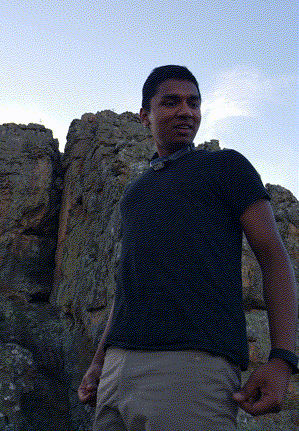Create animated gif from a set of jpeg images
Simon P Stevens' answer almost got me there:
ffmpeg -f image2 -i image%d.jpg video.avi
ffmpeg -i video.avi -pix_fmt rgb24 -loop_output 0 out.gif
Let's see if we can neaten this up.
Going via an avi is unnecessary. A -pix_fmt of rgb24 is invalid, and the -loop_output option prevents looping, which I don't want. We get:
ffmpeg -f image2 -i image%d.jpg out.gif
My input pictures are labeled with a zero-padded 3-digit number and I have 30 of them (image_001.jpg, image_002.jpg, ...), so I need to fix the format specifier
ffmpeg -f image2 -i image_%003d.jpg out.gif
My input pictures are from my phone camera, they are way too big! I need to scale them down.
ffmpeg -f image2 -i image_%003d.jpg -vf scale=531x299 out.gif
I also need to rotate them 90 degrees clockwise
ffmpeg -f image2 -i image_%003d.jpg -vf scale=531x299,transpose=1 out.gif
This gif will play with zero delay between frames, which is probably not what we want. Specify the framerate of the input images
ffmpeg -f image2 -framerate 9 -i image_%003d.jpg -vf scale=531x299,transpose=1 out.gif
The image is just a tad too big, so I'll crop out 100 pixels of sky. The transpose makes this tricky, I use the post-rotated x and y values:
ffmpeg -f image2 -framerate 9 -i image_%003d.jpg -vf scale=531x299,transpose=1,crop=299,431,0,100 out.gif
The final result - I get to share my mate's awesome facial expression with the world:

With ImageMagick:
convert *.png a.gif
You can do this with ffmpeg
First convert the images to a video:
ffmpeg -f image2 -i image%d.jpg video.avi
(This will convert the images from the current directory (named image1.jpg, image2.jpg...) to a video file named video.avi.)
Then convert the avi to a gif:
ffmpeg -i video.avi -pix_fmt rgb24 -loop_output 0 out.gif
You can get windows binaries for ffmpeg here.
You can also do a similar thing with mplayer. See Encoding from multiple input image files.
I think the command line would be something like:
mplayer mf://*.jpg -mf w=800:h=600:type=jpg -vf scale=160:120 -vo gif89a:fps=3:output=out.gif
(Where 800 & 600 are your source width and height and 160 & 120 are the target width and height.out.gif is your target file name)
I've just tested both of these and they both work fine. However I got much better results from mplayer as I was able to specify the resolution and framerate. Your milage may vary and I'm sure you could find more options for ffmpeg if you looked.